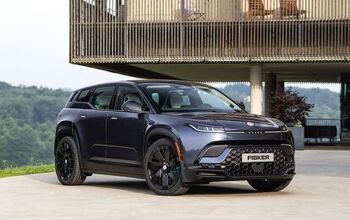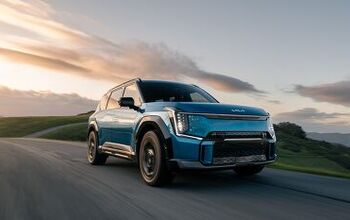Mazda: "Impending Death of the Internal Combustion Is Overrated"
If you were among America’s 1.4 million new vehicle buyers in July 2017, there’s a 99-percent chance your new vehicle requires fuel. Although the vehicles that run off the electric grid are linked to $7,500 government tax credits, they form barely more than half of one percent of the U.S. new vehicle market.
Mazda, you’ll recall, doesn’t sell any electric vehicles in the United States. Mazda doesn’t sell any vehicles with a plug. Mazda doesn’t even sell any hybrids.
So it’s not surprising that Robert Davis, former Mazda USA senior vice president of operations who’s now in charge of special assignments, candidly laid out the case for the internal combustion engine yesterday at the CAR Management Briefing seminars in Traverse City, Michigan.
“The internal combustion engine has a strong future role in transportation,” Robert Davis says.
Automotive News reports that Davis believes the “impending death of the internal combustion engine is overrated.”
“Let the government keep the $7,500,” Davis says, speaking of the EV tax credit, “and let the industry find the best way to meet the clean air standard. Make it CO2, make it grams per mile, fuel economy — whatever feels best. But don’t mandate the particular powertrain.”
Naturally, Mazda is deeply invested in the way regulatory environments approach the conventional internal combustion engine. As a small automaker hoping to earn a modest 2 percent share of the U.S. vehicle market — Mazda’s at 1.7 percent in 2017’s first-half — Mazda doesn’t have the wherewithal to quickly launch a dedicated EV or engineer a plug-in hybrid from the ground up.
Nor does Mazda seem terribly interested in doing so, anyway. “Making a couple of superefficient models,” Davis says in reference to vehicles such as the Fiat 500e, “to offset others really doesn’t make sense to us at Mazda.”
“We just don’t build cars that way.”
Davis says, “We certainly considered the adoption of new technologies, batteries, EVs, plug-in hybrids and everything else.” But with ICE at the foundation, “before we go into the time and effort and expense of adding electrification, we were convinced that a solid, efficient internal combustion engine was critical.”
Hence, Skyactiv branding is all up on e’erything.
Mazda’s Kenichiro Saruwatari said last month that the internal combustion engine was going to be a part of Mazda’s portfolio beyond 2050. Depending on your perspective, Mazda is either planting its head in the sand, swimming against the tide, or simply realistic about the size of the wave.
Mazda’s engine formula is set to change later this year with the arrival of a high-torque four-cylinder diesel in the 2018 CX-5. Hopefully news of its impending arrival is not overrated, as well.
[Image: Mazda]
Timothy Cain is a contributing analyst at The Truth About Cars and Autofocus.ca and the founder and former editor of GoodCarBadCar.net. Follow on Twitter @timcaincars.
More by Timothy Cain
Latest Car Reviews
Read moreLatest Product Reviews
Read moreRecent Comments
- Lou_BC Well, I'd be impressed if this was in a ZR2. LOL
- Lou_BC This is my shocked face 😲 Hope formatting doesn't fook this up LOL
- Lou_BC Junior? Would that be a Beta Romeo?
- Lou_BC Gotta fix that formatting problem. What a pile of bullsh!t. Are longer posts costing TTAC money? FOOK
- Lou_BC 1.Honda: 6,334,825 vehicles potentially affected2.Ford: 6,152,6143.Kia America: 3,110,4474.Chrysler: 2,732,3985.General Motors: 2,021,0336.Nissan North America: 1,804,4437.Mercedes-Benz USA: 478,1738.Volkswagen Group of America: 453,7639.BMW of North America: 340,24910.Daimler Trucks North America: 261,959



































Comments
Join the conversation
The interesting thing is, given the fact that Mazda is really, really good at lightweight construction techniques, it'd seem to be a natural for electrified vehicles. Tells me they don't have the resources to play in that sandbox.
In late, but I have to agree with Mazda here, unless mandated by government forces, electrics have forever to go and are nowhere around the corner in any sort of massive market share kinda way. I actually just saw an analysis done on "fueling" an electric at home in San Diego using electrical consumption of the (I think Leaf), and the cost of tiered electrical rates currently in place in San Diego. It came to basically something like $6+ dollars in electricity for the same distance that a gas car can go for something like $2.50. When you're looking at 2-3x the cost for electrics in "fuel" alone, not to mention the added up-front expense (on some models), general smaller size, the government handouts, slow refueling, potential battery issues longer term etc etc, no rational person will ever choose an electric. Granted people don't act rationally all the time (minivans vs 3 row SUVs etc), but to see any sort of significant market penetration electrics have a boatload of hurdles to overcome. Most people will look at those downsides and pass. There won't be enough electric enthusiasts, or Tesla enthusiasts to make a dent anywhere. Mazda is being completely rational here.